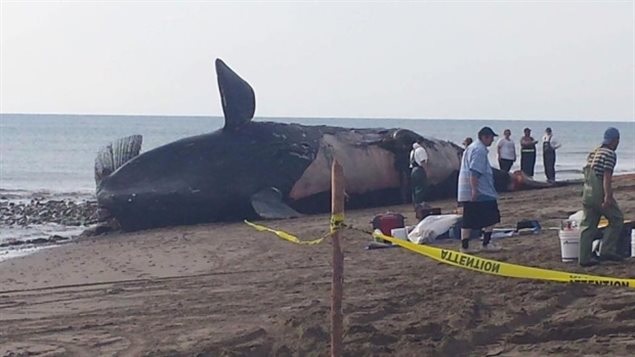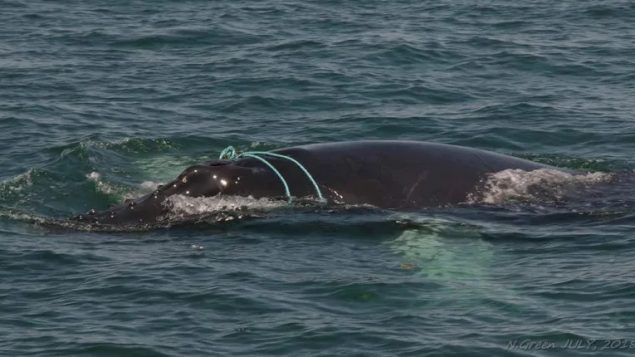Imagine the future of the human race is there were only 411 people left on earth, and less than a quarter were breeding age women.
Add into that dire equation, a very real risk of fatal accidents that claim several lives a year.
That’s the case now now for the North Atlantic right whale.

One of several right whales found dead in 2017 in the Gulf of St. Lawrence. Necropsies suggested ship strikes for some, entanglements for others. (Joey-john Stewart/Facebook- via CBC)
The latest report on the state of the population was released last week by the North Atlantic Right Whale Consortium. The report to the end of 2017 shows a sharp decline in numbers and lists entanglements in fishing gear and ship strikes as the leading cause of death and decline in the mammals.
A year earlier, the population was listed as 451 whales, and the 411 figure didn’t account for three known deaths this year.
Once numbering in the tens of thousands, the whales were almost hunted to extinction primarily for their oil until the early 20th century when there were so few left it was not a viable trade and petroleum products had replaced whale oil. By the 21st century the numbers had slowly climbed back to about 500 but then began to decline again, due mostly to increased shipping and fishing activities resulting in ship strikes of the slow moving whales, and gear entanglements.
The chairman-elect at the Consortium, Scot Kraus,notes that for every dead whale detected probably two other undetected deaths have occurred, noting that probably nine whales have died this year.

July 2018: This humpback calf was eventually freed from the gear entangling it, Without help, the whale would have eventually tired and died from the strain. (Neil Green via CBC)
In addition for the first time in 38 years, no new calves were born this year.
Philip Hamilton, a research scientist at the New England Aquarium and co-author of the report, says its possibly due to two reasons. A whale that has been entangled has been under great stress and the weakness or injuries can delay or prevent reproduction. He says that climate change also means the whales have to move farther for food thereby using up energy reserves which the females need to carry a calf.
The whales have followed a changing food source as it has moved north into the Gulf of St Lawrence where they had seldom ventured previously.
After several right whales were killed last year in Canadian waters, Canada mandated lower ship speeds in the Gulf of St Lawrence and immediate fishing halts when a whale was spotted..
These measures have helped reduce whale losses in Canadian waters.
Researchers are hopeful that increased awareness of the whale’s desperate situation will result in more positive action to avoid unnecessary deaths.
Additional information-sources







For reasons beyond our control, and for an undetermined period of time, our comment section is now closed. However, our social networks remain open to your contributions.